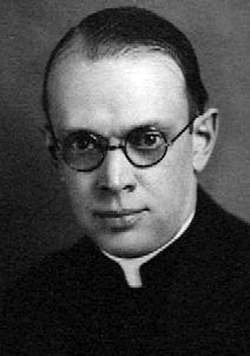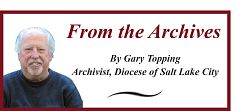Notes from Fr. Duane Hunt, Missionary in Early Rural Utah

Along the Wasatch Front, we are blessed with an abundance of parish churches, so that getting to Mass rarely requires more than a few minutes’ effort. (Ours, for example, is an arduous six-minute journey from our driveway to the church parking lot.) Thus, it is easy for us to ignore the often trying circumstances under which people in rural parts of the Diocese of Salt Lake City maintain an active Catholic life. Vast distances and sparse populations place a serious burden on both priests and people: priests with multiple responsibilities often putting more than 40,000 miles a year on their cars, and people having to accept infrequent access to the sacraments.
It has been thus from the beginning, when the Right Rev. Lawrence Scanlan, the first Bishop of Salt Lake, with horse and buggy had to cover not only the length and breadth of Utah, but the eastern counties of Nevada as well.
A case study in the problems of establishing a permanent Catholic presence in rural Utah may be found in the experience of Father (later Bishop) Duane G. Hunt, whom Bishop Joseph S. Glass sent to the Uintah Basin in 1922 to survey the people and circumstances with the goal of creating a parish.
Fr. Hunt’s notes are both revealing of the broad cross section of humanity in the Basin and (perhaps inadvertently) humorous. Two circumstances crop up most frequently in the two-page document: One was the area’s economy, which was based mostly on livestock grazing and thus required a mobile population that often could not be counted upon to be in town on Sundays. The other was the existence of a Congregational Sunday School, which was to some degree meeting the spiritual needs of Catholics who had no church of their own.
Many of the notes are so discouraging that they would have sent a person with less faith than Fr. Hunt back to Salt Lake City with his tail between his legs, and one marvels that a vital Catholic community could ever have been created out of such recalcitrant material.
Two similar notes, for example, report “Bad marriage to bigoted Mormon [there is no such thing as a bigoted Catholic, of course!]; will do nothing, will not have children . . . baptized; she expresses desire but says husband objects.”
One man was “on mountain most of time [another was “in Colorado most of time”]; no good.”
To Fr. Hunt’s surprise, one woman was “peculiar; would prefer to go to Congregational Sunday School; needs careful study.”
A favorite of mine is “in jail for bootlegging; lives nine miles southwest. Never at Mass [jail would deter that!]. Mrs., five children. Children uninstructed.”
Another fellow is also listed as a bootlegger, indicating that the long arm of the law during Prohibition did not always extend very far into rural Utah.
Most common among the negative respondents, though, was simply religious indifference, which is probably what one would find among non-participating Catholics anywhere: “Acts sullen; avoids me; does not come to Mass.” And “Has lost faith entirely; no good.”
One family was “all baptized, but wholly without faith or interest in the Church.” Some were more ambiguous: “Will not attend Mass; still has faith; had some trouble with Jesuits in college; this still rankles; contributes to support of priest.”
Despite all this discouraging news, Fr. Hunt came away with the feeling that he had found enough tinder that a spark could ignite into a flame. Some respondents were listed as “Excellent Catholic,” or “Good Catholic; comes to Mass when in town.”
Equally encouraging was the number of non-Catholics who expressed an interest in baptism and were studying Catholic literature: “Very much interested, reading Catholic books,” and “Has asked pertinent questions; is reading.” Another was “Sure to become a Catholic in time.” Others faced obstacles that Fr. Hunt thought they could overcome: “Deeply interested: has opposition from her father. Only a matter of time.”
The story has a very happy ending: Fr. Hunt’s faith was borne out, and he became the first pastor of what became St. James the Greater Parish. To be sure, the obstacles did not vanish, and in fact the parish had no pastor from 1926-38, but Fr. Hunt’s prayers and those of the faithful Uintah Basin Catholics prevailed, and since that time the parish has been a vibrant witness to the Gospel in a rural part of the diocese.
Gary Topping is the Diocese of Salt Lake City archivist.
© Copyright 2024 The Diocese of Salt Lake City. All rights reserved.


Stay Connected With Us